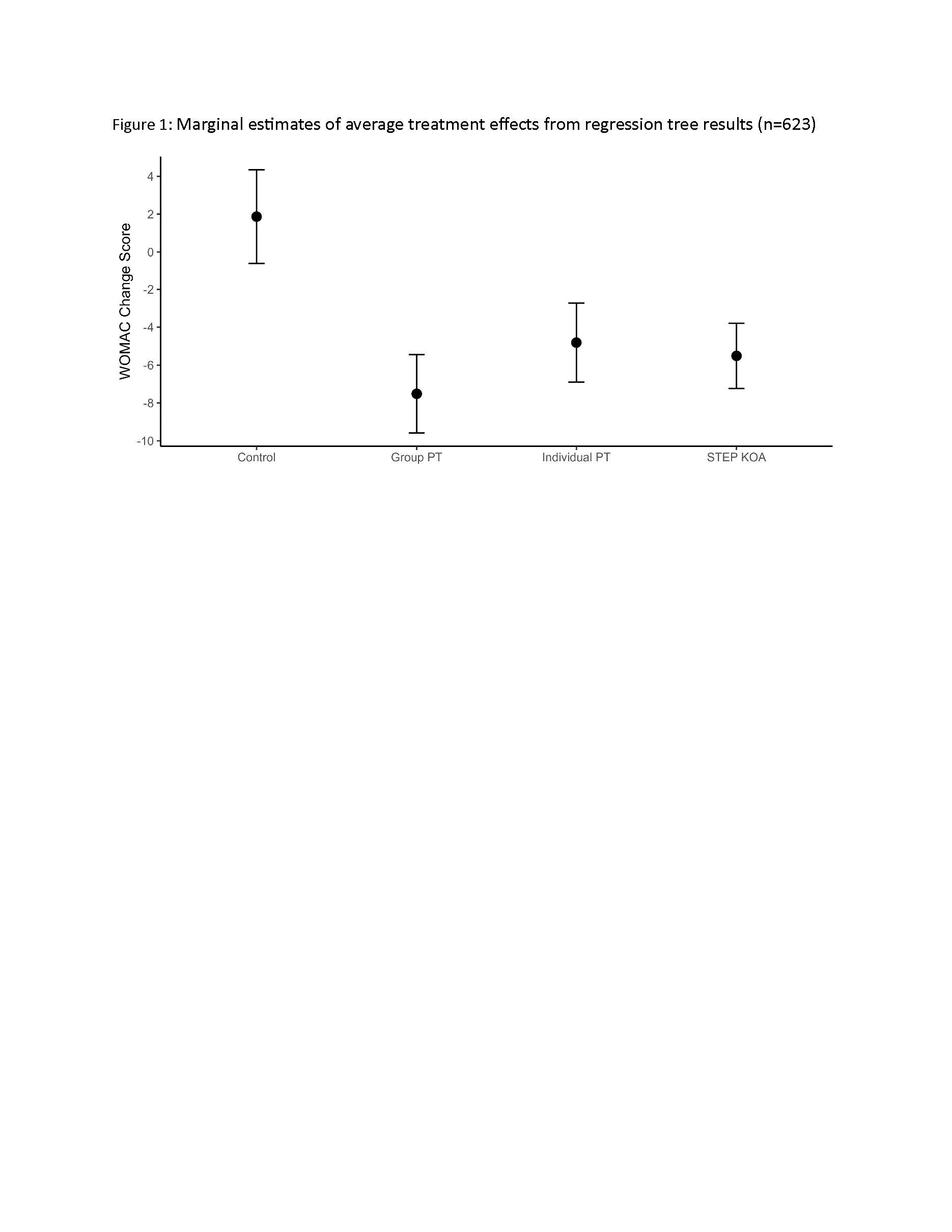Session Information
Date: Sunday, November 17, 2024
Title: Orthopedics, Low Back Pain, & Rehabilitation – ACR/ARP Poster
Session Type: Poster Session B
Session Time: 10:30AM-12:30PM
Background/Purpose: Substantial variability exists in the degree of improvement individual patients experience following exercise-based interventions (EBIs) for knee osteoarthrosis (OA). Yet limited guidance is available regarding which patients benefit most from different EBIs. This lack of clarity can impact both patient-level improvements and healthcare efficiency and costs, since different EBIs vary in the amount and type of support provided to patients. Using a precision machine learning approach, this study leveraged data from two randomized controlled trials (RCTs) among Veterans with knee OA to identify patient characteristics that most strongly contributed to differential treatment effects following the EBIs in the RCTs.
Methods: Participants (n=623) were from two RCTs previously conducted within the VA health care system: the first compared individual physical therapy (PT) versus group-based PT (Group PT), and the second examined a novel Stepped Exercise Program for Knee OA (STEP-KOA) relative to an arthritis education control group. STEP-KOA began with home-based exercise and progressed to physical activity coaching and then PT if participants did not make clinically relevant improvements in prior steps. The primary outcome was change in total Western Ontario and McMaster Universities Osteoarthritis Index (WOMAC) scores from baseline to end of treatment (3 and 9 months for the Group PT and STEP KOA trials, respectively). Predictors included 25 demographic, clinical, and psychosocial characteristics. Three metalearners with three machine learning algorithms each (random forest, extreme gradient-boosted trees, and light gradient-boosted trees), as well as a simple interpretable model-based regression tree, were used to identify subgroups with differential treatment effects. For all 10 models, fit was evaluated with holdout/validation data using root mean square error (RMSE) and mean absolute error (MAE).
Results: The regression tree model outperformed all 9 of the metalearner models based on lower RMSE and MAE values. Tree results suggested that Group PT yields the largest improvement in mean WOMAC (negative score)following treatment (Figure 1). Only one subgroup was identified, baseline WOMAC score < =44 versus >44, with differential treatment response across the EBIs (Figure 2). Although Group PT was the optimal treatment regardless of baseline WOMAC score, results were more ambiguous for patients with higher initial WOMAC scores ( >44), as changes in WOMAC score following treatment were more similar across the EBIs for this group.
Conclusion: Results of these analyses suggest Group PT is a promising approach for patients with knee OA overall, and it may be particularly appropriate for patients with less severe symptoms and functional limitations (e.g., lower WOMAC scores). These results are encouraging, as Group PT is an efficient care model. However, there are some limitations to these exploratory analyses (including different follow-up time for the two RCTs), and further research is needed to confirm these findings.
To cite this abstract in AMA style:
Dennis P, Anderson L, Coffman C, Webb S, Allen K. Exploration of Heterogeneity of Treatment Effects Across Exercise-Based Interventions for Knee Osteoarthritis [abstract]. Arthritis Rheumatol. 2024; 76 (suppl 9). https://acrabstracts.org/abstract/exploration-of-heterogeneity-of-treatment-effects-across-exercise-based-interventions-for-knee-osteoarthritis/. Accessed .« Back to ACR Convergence 2024
ACR Meeting Abstracts - https://acrabstracts.org/abstract/exploration-of-heterogeneity-of-treatment-effects-across-exercise-based-interventions-for-knee-osteoarthritis/



